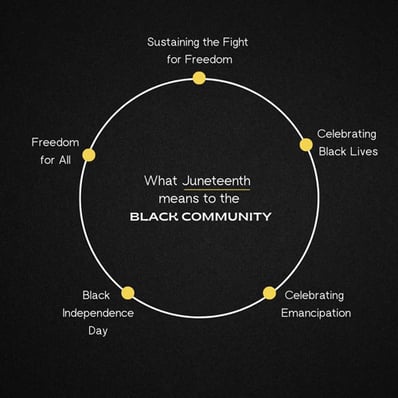Juneteenth, also known as Freedom Day or Emancipation Day, is a significant celebration observed on June 19th each year in the United States. It commemorates the emancipation of enslaved African Americans following the Civil War, and serves as a reminder of the ongoing struggle for equality and justice.
The name "Juneteenth" is a combination of "June" and "nineteenth." It marks the date of June 19, 1865, when the end of slavery was proclaimed.
Historical Background: Juneteenth traces its origins back to June 19, 1865, when Union soldiers, led by Major General Gordon Granger, arrived in Galveston, Texas, to announce the end of slavery. This proclamation, which came two and a half years after the signing of the Emancipation Proclamation, marked a crucial turning point in American history. The news of freedom ignited jubilation and relief among the enslaved people, and Juneteenth became a day of immense importance.
Significance and Celebration: Juneteenth symbolizes the triumph of freedom over oppression and the resilience of the African American community. It serves as a reminder of the struggles endured by enslaved people and their quest for equality. The celebration emphasizes education, reflection, and community engagement, aiming to foster a deeper understanding of African American history and culture.

Traditions and Customs: Juneteenth celebrations vary across different communities, but several customs are commonly observed. Parades, marches, and rallies are held, showcasing African American pride and heritage. Historical reenactments, music performances, and art exhibitions contribute to the festive atmosphere. Many gather for picnics and barbecues, sharing traditional foods and recipes. Red food and drinks, such as red velvet cake or red punch, are often served as a symbolic representation of resilience and perseverance.
Education and Cultural Awareness: Juneteenth provides an opportunity to educate people about the history of slavery, the struggle for civil rights, and the contributions of African Americans to society. Schools, museums, and community organizations organize workshops, lectures, and exhibitions to promote awareness and foster dialogue. It is essential to embrace Juneteenth as a time for learning and understanding, ensuring that the next generation is well-informed about the nation's complex history.
Juneteenth and the Journey to Equality: While Juneteenth celebrates the emancipation of enslaved African Americans, it also highlights the ongoing fight for equality and justice. It serves as a reminder that the struggle for civil rights is far from over and encourages individuals to actively engage in creating a more inclusive society. Juneteenth celebrations often incorporate discussions on racial equality, social justice, and the importance of allyship, inspiring collective action toward a more equitable future.
In summary. Juneteenth stands as a significant and cherished occasion in American history. It commemorates the liberation of enslaved African Americans, celebrates their resilience, and fosters a deeper understanding of their heritage. By acknowledging Juneteenth, we honor the struggle for equality and commit ourselves to creating a society where every individual is treated with dignity and respect.
Let us embrace this day as a reminder of the progress we've made and the work that still lies ahead.





Leave a Comment